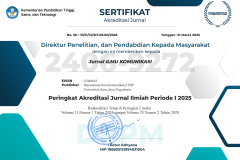Public Understanding and Communication Strategy Evaluation of Local Regulation No. 09 Year 2004 on Zero Child Labour Zone in Kutai Kartanegara Regency
DOI:
https://doi.org/10.24002/jik.v8i2.173Abstract
Abstract: Child labour is a universal phenomenon that occurs in most parts of the world. Indonesia as part of developing countries cannot be separated from the issue, including Kutai Kartanegara (Kukar) regency which is one of the richest areas in the country. Although Kukar regency is chosen as one of the model in the elimination of child labour, this is accompanied by people’s understanding on Child Labor Free Zone program enacted by the local government. This study tried to explore people's understanding of Regulation No. 09/ 2004 on ZBPA and evaluate communication strategies effectively used to build and optimize the sustainability of the program. It is important as public participation can only be improved if the communication is conducted in a proper way.
 Abstrak: Pekerja anak merupakan fenomena universal yang terjadi di hampir seluruh belahan dunia. Indonesia sebagai bagian dari negara berkembang juga tidak terlepas dari masalah ini, termasuk didalamnya Kabupaten Kutai Kartanegara yang merupakan salah satu daerah terkaya di negeri ini. Terpilihnya Kab Kukar sebagai salah satu daerah model pengentasan pekerja anak, ternyata tidak dibarengi dengan pemahaman masyarakatnya mengenai program Zona Bebas Pekerja Anak yang diusung pemerintah setempat. Penelitian ini mencoba menggali pemahaman masyarakat terhadap Perda No 09/2004 tentang ZBPA, dan kemudian mengevaluasi strategi komunikasi yang efektif digunakan untuk membangun dan memaksimalkan keberlangsungan program tersebut. Hal ini penting untuk dilakukan mengingat partisipasi publik hanya dapat dibangun jika komunikasi dilangsungkan dengan cara yang tepat.
Downloads
Published
How to Cite
Issue
Section
License
Jurnal ILMU KOMUNIKASI is an academic journal. As such, it is dedicated to the open exchange of information. For this reason, JIK is freely available to individuals and institutions. Authors who publish in Jurnal ILMU KOMUNIKASI will release their articles under the Creative Commons Attribution (BY) License. This license allows anyone to copy and redistribute the article in any medium or format as well as remix, transform, and build upon the material for any purpose, even commercially as long as they credit the authors for the original creation. For details of the rights authors grants users of their work, see the "human-readable summary" of the license, with a link to the full license. (Note that "you" refers to a user, not an author, in the summary)
 This work is licensed under a Creative Commons Attribution 4.0 International License.
This work is licensed under a Creative Commons Attribution 4.0 International License.














